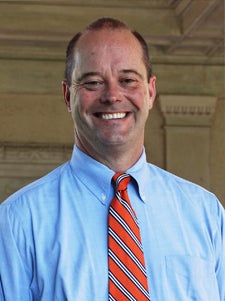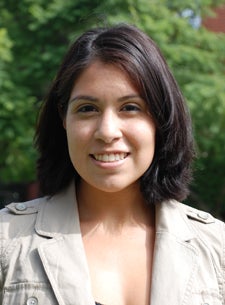Saga of the Southland
There may be few clashes in Los Angeles history that cut as deep as the rivalry between the USC Trojans and the UCLA Bruins. But this Fall, members of both sides are putting aside any contentions to study the city they call home.
The graduate seminar “Studies in Urban History: Los Angeles” brings together students from USC Dornsife and UCLA to examine the rapid development and evolution of metropolitan L.A.
The city, which was a modest crossroads community as recent as about 150 years ago, has catapulted to global influence and significance. That’s a fascinating journey to take students through, Bill Deverell said.
“Los Angeles is so interesting because on one hand it seems to defy characterization and invite caricature — that ‘only in L.A.’ kind of sentiment and sensibility,” he said. “But there’s just so much to study here about urban identity, architectural form and experimentation, and the antagonisms of diversity as well as the ways in which this basin has figured out ways to work together.”
The course is co-taught by Deverell, professor of history in USC Dornsife and director of the Huntington-USC Institute on California and the West (ICW), and Eric Avila, associate professor of history, and Chicano studies and urban planning at UCLA.
As colleagues for many years, Deverell and Avila had tossed around the idea of co-teaching a course on L.A. history. When the invitation came from the chair of UCLA’s history department the two jumped at the opportunity.

Bill Deverell, professor of history in USC Dornsife and director of the Huntington-USC Institute on California and the West, notes the buzz around bringing together students from USC Dornsife and UCLA to study the social, cultural, political and environmental development of L.A. “It’s lively and exciting to get the two scholarly communities together,” he said. Photo by Laurie Moore.
Deverell is a social historian of L.A.’s growth from the mid-19th-century on, concentrating on the political, social, ethnic and environmental history of the American West. Avila is an urban and cultural historian of 20th-century America, focusing on the historical intersections of racial identity, urban space and cultural representation. Together, their areas of expertise overlap to build a dynamic perspective of Los Angeles.
“It’s almost like two pieces of a scholarly puzzle,” Deverell said. “Eric has an intellectual breadth and vision about the history of the city against other metropolitan regions across the world, and I’m more of an everyday historian of L.A. on what’s going on at the ground level.”
Alicia Gutierrez, a history doctoral student in USC Dornsife enrolled in the course, agrees. “They both have complementary focuses and it really brings everything together in a nice coherent course with a collaborative element,” she said.
Classes are taught for the first half of the semester at The Huntington Library, Art Collections, and Botanical Gardens in San Marino, and the other half on the UCLA campus. Students from USC Dornsife and UCLA are enrolled, as well as a student from the University of California, Riverside. On occasion, other students will sit in.
“I think there’s a little bit of a buzz around the class,” Deverell said. “It’s lively and exciting to get the two scholarly communities together.”
In addition to chronicling the social, cultural, political and environmental development of Los Angeles, students delve deeper into topics of their choosing. Gutierrez is using the opportunity to flesh out her doctoral thesis on the eugenics movement in Los Angeles.
From the end of the 19th century to the beginning of the 20th, Gutierrez noted there was a pervasive belief in the United States that society should encourage the reproduction of desirable genetic characteristics and discourage those deemed negative. However, after World War II ended and the world learned of the atrocities committed by the Nazis’ and their experiments with eugenics, the movement was abandoned.

Alicia Gutierrez, a history doctoral student in USC Dornsife, will delve into the history of the eugenics movement in Los Angeles during the turn of the century for her research in the course “Studies in Urban History: Los Angeles.” Photo by Michelle Salzman.
With the historically multiracial composition of L.A., the eugenics movement in the region is particularly rich to study, Gutierrez said. In particular, she is focusing on new ways to look at the phenomenon.
“Right now I’m looking at food hygiene and food ordinances,” Gutierrez said. “At what point did people make a connection with what they put into their body to how it affected them or, at this particular moment, their race?”
As part of the course, students gain access to the special collections at the Huntington Library, which houses manuscripts, rare books, photographs, prints and ephemera from all periods of American history. Usually, students would have to wait until later in their graduate career to apply for research privileges at the Huntington, Deverell said.
“It’s a very good opportunity for my classmates and I to get started on research and work in institutions that are nationally recognized,” said Christian Paiz, a history Ph.D. student in USC Dornsife.
Paiz is studying California farmworkers in the postwar period, focusing on the United Farm Workers movement and César Chávez. He said he will use the Huntington’s archives to search for representations of that struggle in L.A. in news outlets or in promotional materials from the ’50s and ’60s.
So what is it like to take a class with students from your rival institution? The chance to collaborate with peers overshadows any sense of competition, according to Gutierrez.
“When you’re a graduate student it’s really important to establish these cross-institution networks and communities,” she said.
“Having all of these ideas in one room and bouncing them off of each other, it’s a really great opportunity that you can’t always get in one insular USC or UCLA community.”
As scholars and historians, the students will potentially make connections that resonate throughout their professional lives, Deverell pointed out. “After all, if these students pursue careers in academe they’re going to know each other for the rest of their careers.”